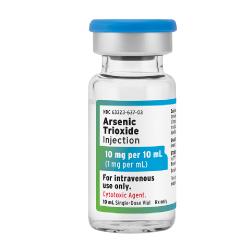Description
Rucaparib 200 mg Tablet, a PARP inhibitor, is utilized in the following conditions:
Ovarian Cancer:
- For adults with recurrent ovarian, fallopian tube, or primary peritoneal cancer who have responded to platinum-based chemotherapy.
Prostate Cancer:
- In adult patients with metastatic castration-resistant prostate cancer (mCRPC) and a deleterious BRCA mutation after specific prior treatments. Selection is guided by an FDA-approved companion diagnostic for Rucaparib Tablet.
Dosage and Side Effects
- Recommended Dose: Take Rucaparib tablet 600 mg orally twice daily, regardless of food intake, until disease progression or unacceptable side effects.
- Management: If adverse reactions occur, consider interrupting treatment or reducing the dosage.
- Special Consideration: Patients with mCRPC should concurrently receive a gonadotropin-releasing hormone (GnRH) analog or have had bilateral orchiectomy.
Ovarian Cancer:
Common adverse reactions among patients with ovarian cancer included nausea, fatigue, vomiting, anemia, changes in liver function tests, gastrointestinal issues, and breathing difficulties.
BRCA-mutated mCRPC:
Among patients with BRCA-mutated mCRPC, common adverse reactions were fatigue, nausea, anemia, changes in liver function tests, gastrointestinal problems, and rash.
FAQ's
What is the primary use of Rucaparib?
Rucaparib 200 mg tablet is mainly used for:
- Treating recurrent ovarian, fallopian tube, or primary peritoneal cancer in adults after responding to platinum-based chemotherapy.
- Managing metastatic castration-resistant prostate cancer (mCRPC) in adults with a specific BRCA mutation post-prior treatments, guided by an FDA-approved diagnostic.
How should Rucaparib be taken and managed?
The recommended oral dosage is 600 mg twice daily, irrespective of meals, until disease progression or if side effects become intolerable. If adverse reactions occur, treatment interruption or dosage reduction may be considered. Special consideration is necessary for mCRPC patients who should also receive a GnRH analog or have had bilateral orchiectomy.
What are the common side effects linked with Rucaparib?
Common side effects for ovarian cancer patients include nausea, fatigue, vomiting, anemia, liver function changes, gastrointestinal issues, and breathing problems. For BRCA-mutated mCRPC patients, common side effects encompass fatigue, nausea, anemia, liver function changes, gastrointestinal problems, and rash.
What are the critical precautions for using Rucaparib?
Monitoring for Myelodysplastic Syndrome/Acute Myeloid Leukemia (MDS/AML) is crucial as some patients exposed to Rucaparib have experienced these conditions. Regular monitoring and potential dosage adjustments are advised. Additionally, due to fetal risks, effective contraception should be employed during Rucaparib treatment.
Who manufactures Rucaparib, and in what strengths and packaging is it available?
Rucaparib tablet is manufactured by Clovis Oncology, Inc. It’s available in tablet form, packaged with 60 tablets per pack, in strengths of 200 mg and 300 mg.






